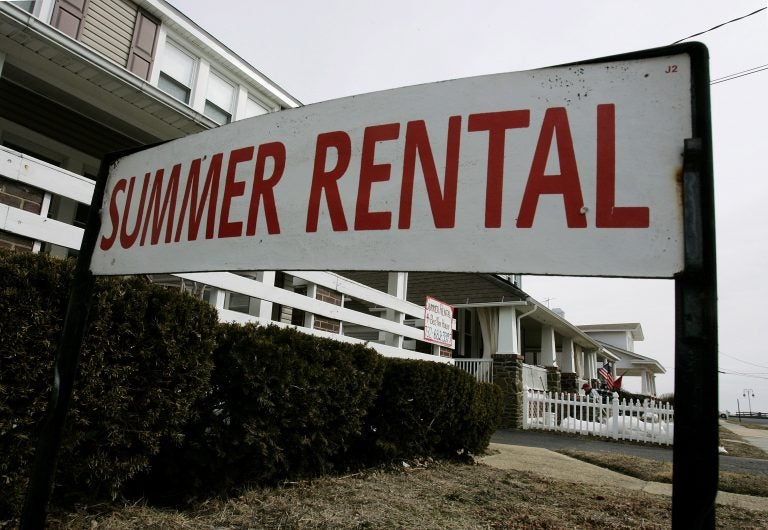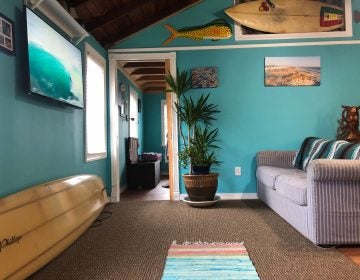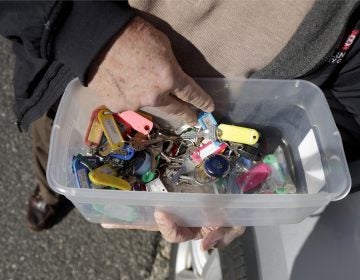N.J. may roll back tax on Shore rentals, but details remain fuzzy
When will the measure take effect? Who will it help? Key questions still unanswered as lawmakers move ahead with votes on tax on Shore rentals.

In this file photo, a summer rental sign is seen in front of a home just one block from the ocean, in Belmar, N.J. (Mel Evans/AP Photo, file)
New Jersey lawmakers are moving to exempt many Shore-goers from an unpopular new tax on home rentals, but it’s still unclear when the change would take effect — and who exactly it would help.
A vocal group of renters and owners has been pushing for the change since last year, when lawmakers worked with Gov. Phil Murphy, a Democrat, to create a nearly 12% tax on short-term rentals.
The law was intended to make accommodations booked through online marketplaces such as Airbnb subject to the same taxes as hotels and motels.
But the way the “Airbnb tax” was written, it applies to all rentals lasting less than 90 days not booked through a real estate broker, including Shore properties filled with the help of yard signs, classified ads, Facebook groups or personal connections.
The Assembly voted unanimously this week to approve a measure, A-4814, that would make the tax apply only to rentals arranged through marketplaces where bookings can be offered, reserved and paid.
That would spare renters who arrange their stays directly with property owners. The change would take effect immediately upon being signed into law by the governor, according to the bill.
But Sen. Vin Gopal, a Democrat from Monmouth County sponsoring a companion bill in the upper house, said he wants to amend the measure so the exemption applies more narrowly to owners with two or fewer units and their guests.
And under his bill, the change would not take effect “until the first day of the first calendar quarter beginning at least 60 days following the date of enactment” — meaning Oct. 1 at the earliest.
Asked which version would be the one eventually sent to the governor, Gopal said he didn’t know.
“I don’t have the answer, but I’m hoping it will be closer to what I’m describing,” he said.
The chief of staff for Assemblywoman Joann Downey, D-Monmouth, a prime sponsor of the Assembly version, declined to comment on Gopal’s proposal.
Time is of the essence, said Duane Watlington a founder of the NJ Shore Rentals Coalition, a grassroots group that has hired a lobbyist to push for the exemption.
Watlington, a Monroe Township resident who rents out a duplex in Ship Bottom on Long Beach Island, is one of several owners who has said rentals are down this year because of the new tax.
“While there’s already been a negative effect on our summer this year, we’re hopeful that if we get this correction and the governor signs it into law soon, we can still save most of the summer,” he said ahead of the Memorial Day weekend.
Kathy Truesdale, whose family is facing an $813 tax on a weeklong, $7,000 rental in Cape May next month, said not having to pay the tax would allow her family to instead spend that money locally, eating out and renting golf carts to drive her grandkids to the beach.
“For us, it just enhances the vacation tenfold,” she said.
Groups including the New Jersey Hotel & Lodging Association and the New Jersey Tourism Industry Association, which pushed for the Airbnb tax, oppose the Assembly version of the bill.
But Joseph Simonetta, who represents both organizations, said he would support the measure with Gopal’s amendments.
“If this is an individual or a duplex that somebody is renting to either help them own vacation property or help them supplement a vacation property, it was not our intent” to tax those people, he said. “But if you have five, six, 10, 20 properties, a building, which is a lot of what’s going on here, that’s a business and we want parity with businesses regardless of how you book your property.”
Also opposed to the Assembly bill is Airbnb, which argues that all short-term rentals should be treated the same. The company has warned the measure could cause confusion for renters, who may see the same accommodation listed for different prices on different platforms.
The state has estimated it will bring in about $8 million from taxing short-term rentals this fiscal year — and about $12 million to $15 million next year. The state’s current budget is $37.4 billion.
WHYY is your source for fact-based, in-depth journalism and information. As a nonprofit organization, we rely on financial support from readers like you. Please give today.




